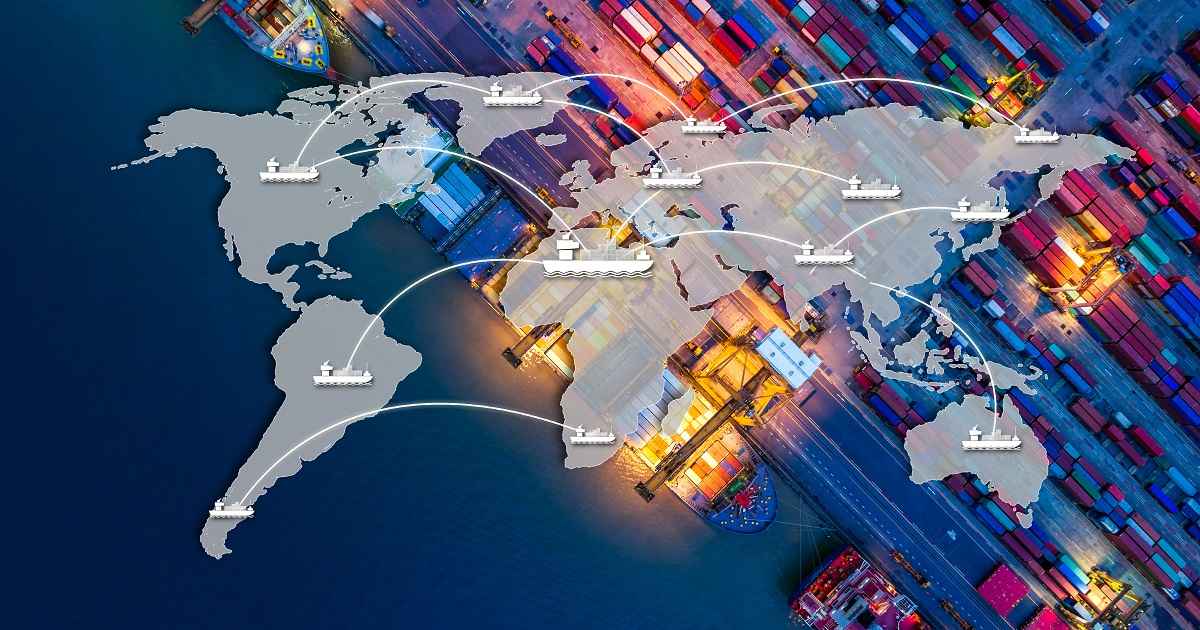
Management
Article | June 21, 2023
Oracle, a leading provider of computer technology, published a paper analyzing how supply chain managers should use change as a catalyst in "inspiring and engaging employees." In the report, Oracle highlights how organizations across the world are going through radical shifts in the way they operate.
Customers need quick, convenient, and customized solutions today. Employees also have higher expectations, looking for companies that are a match for their values, provide flexible working arrangements, and offer cutting-edge tools. Shareholders and investors also want more, which forces businesses to focus on making money in ways that are sustainable and diverse.
See Change as an Opportunity
The companies that are most successful, according to Oracle, are those who see change as just another opportunity to reinvent, and the company lists four ways supply chain leaders might find such an opportunity:
Boost employee engagement
Aim for sustainability and responsibility in management
Be quick to respond to disruptions in the supply chain
Exceed consumer expectations
In the paper, Oracle reports that instead of adapting to the change, organizations must be able to stay on top of challenges and prepare well in advance.
Align with an Employee-Centred Culture
Leaders must be able to attract well-matched talent, with the skills to not just fulfil job roles but also drive innovation. Today, people value a work-life balance where they have time to pursue their non-work interests, spend time with their families, and create a diverse, and inclusive world. According to Oracle, this is a significant consideration, and organizations that meet the demands of this new workforce will have a competitive edge in hiring the top talent.
Looking Forward
The Great Resignation has been a hot topic in HR, but the truth is it affects all aspects of business, and importantly, the supply chain, and in the end, the ability to provide smooth customer experiences. HR, customer experience, and supply chain leaders must synergize to become an employer destination to reckon with in order to succeed.
Read More

Warehousing and Distribution
Article | June 16, 2023
Transform the supply chain with cutting-edge warehouse automation tools. Enhance productivity, minimize costs, and deliver exceptional customer experiences to stay ahead in the competitive market.
In the rapidly evolving world of manufacturing, logistics, and supply chain management, adopting automation has become imperative for businesses aiming to maintain a competitive edge. By minimizing costs, enhancing efficiency, and reducing downtime, automation delivers optimal value for manufacturers. However, selecting the right partner can be challenging with numerous warehouse automation companies available. This article explains the features and benefits of top ten warehouse automation tools that offer expertise in improving business operations. These data warehouse tools provide comprehensive solutions to meet diverse needs of the logistics and warehousing companies and improve the supply chain performance.
1. 3PL WMS Software Solution
3PL WMS Software Solution is one of the leading warehouse automation tools for supply chain operations. This software has comprehensive features that automate and streamline warehouse processes, offering unprecedented efficiency. The tool seamlessly integrates with existing systems and provides total transparency and control. 3PL warehouse automation software boosts order throughput, reduces pick time, and automates billing effortlessly. Gain unprecedented insights through accurate, real-time reporting, ensuring inventory accuracy and reducing lost-inventory costs. This warehouse automation tool, designed as the warehouse management backbone, revolutionizes operations, enhances customer satisfaction, and drives exponential growth.
2. Datex 3PL WMS
Datex 3PL WMS offers the most innovative warehouse management tools that help implement warehouse automation in the supply chain process for transportation services. This software empowers transportation and logistics services, revolutionizing material handling, storage, trans-loading, cross-docking, and more. It supports diverse industries such as refineries, steel mills, and energy distribution facilities. Its flexibility makes it an optimal solution to handle any inventory type, including bulk materials, steel products, liquids, and hazardous materials. This automated warehouse software also enables multi-warehouse operations and accommodates various modes of transportation. Additionally, Datex 3PL WMS boasts a highly flexible billing system, allowing individualized billing strategies and capturing value-added services. Industry experts benefit from streamlined processes, improved efficiency, and accurate billing, ultimately enhancing their supply chain business and warehouse operations.
3. Deposco
Deposco Bright Warehouse is a game-changing warehouse management software solution that offers advanced features and capabilities to businesses of all sizes. This data warehouse tool empowers companies to pick, pack, and ship orders efficiently, optimizing processes to further improve order fulfillment while reducing operational costs. It provides strategic order allocation, workgroup segmentation, and optimized picking strategies, to achieve accurate and speedy order fulfillment. The software offers network-wide inventory visibility through advanced tracking, barcoding, and management capabilities. This solution automates shipping processes by seamlessly integrating with carriers, ensuring maximum accuracy and speed. Leveraging its material handling technology for automation can lead to significant productivity improvements. Businesses can enhance their capabilities by accessing a unified view of operations, utilizing customization options, and benefiting from direct API integration with shipping carriers.
4. Softeon
Softeon is a powerful warehouse management tools for supply chain automation. Its comprehensive WMS optimizes distribution operations, handling all essential tasks while offering unique functionality for a competitive edge. With a proven deployment success rate and flexible delivery options in the cloud or on-premise, Softeon empowers businesses to streamline inventory management and delivery processes. By integrating with their Warehouse Execution System (WES), warehouse and distribution companies can further enhance order fulfillment orchestration and optimization. Industry leaders like UPS Supply Chain Solutions and Sears Home Services rely on this warehouse automation software.
5. Logiwa WMS
Logiwa WMS offers a cloud fulfillment platform that combines WMS software and order fulfillment capabilities, enabling companies to operate a digital fulfillment network and expand their direct-to-consumer operations without the need for additional staff. The data warehouse management tool offers comprehensive warehouse and inventory management functionality, billing, and seamless integrations with over 200 ecommerce, accounting, and shipping solutions; it empowers 3PL providers to optimize order fulfillment, enhance speed and accuracy, and drive customer satisfaction.
6. SnapFulfill
SnapFulfill is one of the leading warehouse management technologies that empower companies across various industries, including B2C and B2B retail, third-party logistics, manufacturing, food and beverage, and electronics, to optimize their inventory, space, and resources. With SnapFulfill's class-leading warehouse management solutions, businesses can streamline operations and enhance efficiency. The software offers flexible deployment options and payment methods for diverse warehousing challenges. By utilizing SnapFulfill, industry experts gain access to advanced data warehouse tools that enable them to improve their supply chain business, enhance warehouse and distribution processes, and achieve optimal inventory management for increased productivity and profitability.
7. Indigo Software
Indigo WMS is an award-winning warehouse management system tool designed to enhance supply chain operations. It offers real-time control, visibility, and functionality for all warehouse processes. It is one of the best supply chain tools to track inventory in real-time, enabling efficient cycle counting, forward pick replenishment, and improved inventory forecasting. With Indigo WMS warehouse automation software, these tasks are automated, and the software ensures greater picking accuracy, reduces returns, and enables on-time and complete deliveries. It seamlessly integrates with existing systems, whether from SAP, Microsoft, Oracle, Infor, Sage, or other ERP, TMS, or SCP vendors, providing live and up-to-date data visibility across the entire supply chain process.
8. OrderWise
OrderWise is an order management system that empowers businesses in the consumer goods and retail sector to accelerate operations and deliver exceptional customer service. With its integrated features, OrderWise ensures seamless order processing and maximizes sales opportunities. By tracking orders from various sales channels, managing tight schedules, and making real-time adjustments, businesses can meet customer demands promptly. This is one of those supply chain management tools that provides valuable insights into customer purchase history and stock availability, enabling personalized recommendations and enhancing sales effectiveness. Whether for ecommerce, retail, or B2B sales, OrderWise streamlines order operations, making them smoother, faster, and more accurate.
9. Balloon One
Balloon One provides supply chain management tools, offering tailored software solutions to distribution, manufacturing, and e-commerce businesses. Its expertise lies in streamlining processes, optimizing resource allocation, and enhancing operational efficiency. With a focus on minimal disruption, Balloon One seamlessly implements software solutions, ensuring uninterrupted business operations. As an impartial advisor, the software offers both SAP Business One and NetSuite, thus allowing to recommend the ideal ERP system for each company's unique requirements. In addition, this software provides wholesale and distribution businesses with the robust HighJump WMS, a real-time warehouse management system that delivers scalability and flexibility.
10. Foxfire
Foxfire offers supply chain management tools specializing in Warehouse Management Systems (WMS). It offers WMS solutions, including features to optimize inventory, increase labor productivity, and enhance customer satisfaction. With over 20 years of industry experience, Foxfire has a proven track record of delivering measurable results to customers worldwide. This tool provides a comprehensive approach, including needs assessment, best practice recommendations, training, and ongoing support. Additionally, it is cost-effective by delivering low lifetime costs.
Conclusion
The warehouse automation market is experiencing significant growth, with a wide array of exceptional warehouse automation tools that offer high-quality solutions. Regardless of any special requirements, exploring the features of each warehouse automation tools is vital to identify the ideal fit for any business. Choosing the correct solution from the data warehouse tools list will help to improve inventory management and distribution efficiency through warehouse automation. Embrace the opportunity to streamline processes by leveraging supply chain management tools and warehouse automation solutions and experience the transformative power of automation to unlock the full potential of your business.
Read More

Supply Chain
Article | May 22, 2023
Explore the techniques to improve warehousing and distribution centre. Learn from the best books of logistics and distribution management and enhance warehousing operations and distribution processes.
Efficient warehouse management is crucial in the complex world of distribution and logistics. With various warehouse types serving different purposes, warehouse managers are responsible for ensuring smooth operations, safeguarding valuable goods, and optimizing supply chain units. Building a strong knowledge base is key, and the best way to start is by delving into the top warehouse management books. This article presents a curated list of essential reads that will provide you with a solid foundation in the warehouse and distribution field. From understanding fundamentals to exploring cutting-edge practices, these books help in better decision-making regarding warehousing and distribution operations.
1. Fundamentals of Warehousing & Distribution
Author Name: Material Handling Industry
Fundamentals of Warehousing & Distribution is an essential book for professionals in the warehousing and distribution industry. Published as part of the MHI Career & Technical Education Program, this series of four warehouse management books provides comprehensive knowledge on material handling equipment, information technology tools, and warehouse operations. Volume 1 serves as a foundational guide, introducing readers to modern warehouses and distribution centers' equipment, processes, and operations. With its focus on practical knowledge and industry best practices, this warehouse and distribution book provides readers with the skills and expertise necessary for successful warehouse and distribution management.
2. Warehousing and Distribution Practices
Author Name: xu ji ying
Divided into two parts, Warehousing and Distribution Practices covers seven key areas of the real-world processes for managing storage and implementation of effective distribution strategies. This distribution management book focus on essential knowledge and skills, each section provides valuable insights through logistics standard terms, case studies, knowledge links, and practical application. As one of the best books on logistics and distribution management, it will give you the complete step-by-step guidance to expand and improve warehousing and distribution centre by leveraging the theory shared by xu ji ying.
3. Warehousing And Distribution Management Project Type Tutorial
Author Name: Wang Yu
Warehousing and Distribution Management Project Type Tutorial, a logistics and supply chain management book, revolutionize logistics education with its innovative approach. This comprehensive book goes beyond traditional teaching methods, immersing readers in real-world scenarios and practical projects. Through eleven immersive teaching projects and thirty-two dynamic learning tasks, readers gain hands-on experience in system planning, business management, quality control, inventory operations, technology application, and more. Developed in collaboration with industry experts, this tutorial bridges the gap between theory and practice, empowering logistics professionals to navigate the complexities of warehouse and distribution management. With its unique project-based structure, this warehousing and distribution book delivers a transformative learning experience for aspiring logistics and supply chain industry leaders.
4. Fundamentals of Warehousing & Distribution: Volume 3
Author Name: MHI
Fundamentals of Warehousing & Distribution, a logistics and supply chain management book revolutionizes how logistics professionals perceive warehouses. By delving into captivating case study examples, this book unveils the intricacies of different warehouse configurations, showcasing how cutting-edge equipment and technologies empower diverse order fulfilment strategies. It challenges conventional wisdom by emphasizing that warehouses are no longer mere storage spaces; they have transformed into dynamic hubs that efficiently cater to a wide range of order types, from bulk shipments to individual products. With its ground-breaking insights and practical applications, this volume is a game-changer for industry experts seeking to elevate their warehousing and distribution management skills.
5. Warehouse Distribution and Operations Handbook
Author Name: David Mulcahy
Optimize warehouse operations with this warehouse and distribution management book, Warehouse Distribution and Operations Handbook. With a focus on improving inventory management, reducing costs and enhancing customer experiences, this handbook offers best practices, methods, equipment applications and technologies to utilize in different warehouse and distribution centres. Whether it's industrial, mail-order, or retail facilities, this comprehensive logistics and distribution management book provides the knowledge and strategies to drive profitability and control assets. It is an essential resource for anyone in the logistics industry looking to master distribution management and excel in warehouse operations.
6. Warehouse and Distribution Centre
Author and Editor Name: Robert Mulder & Michiel Kobussen
The warehouse and Distribution Centre is a valuable resource for logistics professionals and architects navigating the evolving landscape of warehouse design. This distribution management book addresses designers' pressing challenges, including cost control, technical requirements, and safety considerations. It offers a comprehensive system of theories, guidelines, and design standards, accompanied by a diverse collection of global warehouse and distribution centre projects. Balancing both the ends of practical reference and inspirational examples, this best book for distribution management equips readers with the knowledge and insights needed to create efficient, innovative, and sustainable warehouse and distribution solutions. It is a must-read for anyone involved in warehousing and distribution management.
7. Warehousing and Distribution Operation Practice
Author Name: peng jian cheng
Rooted in practical vocational education, Warehousing and Distribution Operation Practice is a book that emphasizes integrating theoretical knowledge with functional operations. It provides a hands-on approach to learning, enabling readers to apply their knowledge directly in real-world scenarios. This warehousing and distribution book will give you the required skills and expertise to optimize operational efficiency. With the help of practices shared by peng jian in the warehouse management book, readers will get insights into supply chain management and logistics operations. In addition, it will not only help in improving the processes in the warehouse and distribution but also enhance the overall business.
8. Operations and Supply Chain Management Essentials You Always Wanted to Know
Author Name: Vibrant Publishers & Ashley McDonough
Overcome the complexities of supply chain management and warehouse operations with Operations and Supply Chain Management Essentials You Always Wanted to Know. This engaging book takes you on a captivating journey through the interconnected world of logistics, unveiling the significance of every step in the process. Through a compelling narrative centred around a fictional company and its consumer product, you'll explore the challenges, decisions, and adaptations supply chain professionals face. Gain a deep understanding of supply chain operations, from disruptive forces to practical applications, and discover the importance of interactive business domains.
9. Start your Own Wholesale Distribution Business
Author Name: The Staff of Entrepreneur Media & Christopher Matthew Spencer
Embark on a lucrative journey in the distribution industry with 'Start Your Own Wholesale Distribution Business.' This comprehensive guide, crafted by the experts at Entrepreneur Media, equips you with the essential steps to establish a thriving wholesale operation from the comfort of your home. Discover the art of being an intermediary, connecting manufacturers and retailers to reap profits. Uncover industry-specific strategies, secure funding, identify profitable niches, forge valuable partnerships, and effectively market your business. With insights from experienced wholesale distributors, sample forms, checklists, and worksheets, this warehousing and distribution book is your roadmap to mastering the world of distribution and logistics.
10. Warehouse Management: The Definitive Guide to Improving Efficiency and Minimizing Costs in the Morden Warehouse
Author Name: Gwynne Richards
Discover one of the best books for logistics management in the modern era with 'Warehouse Management: The Definitive Guide to Improving Efficiency and Minimizing Costs in the Modern Warehouse.' This extensively updated fourth edition delves into the latest technologies, such as robotics, cobots, and AI, revolutionizing warehouse operations. Author Gwynne Richards offers expert insights and realistic solutions to optimize warehouse performance and improve efficiency. This effective distribution management book provides strategies and environmental initiatives to ensure a sustainable supply chain. Packed with real case studies and online resources, this book is an essential resource for distribution and logistics professionals.
Conclusion
Warehousing and distribution books have been a valuable resource for reference in the logistics field. While this compilation is not exhaustive, it offers a robust selection of warehouse management books that can effectively address various related challenges. Whether seeking insights into warehouse and transportation management or exploring other facets of supply chain management, logistics management, and procurement, the knowledge gained will be a worthwhile investment for future decision-making.
Read More

Supply Chain
Article | November 11, 2022
The complexity of today’s supply chain has resulted in a highly fragmented supply chain ecosystem. Whether it is a global pandemic or an ongoing war, streamlining the moving parts in the supply chain management system is an immense feat in the current climate. The resulting shortage of materials, disruption of transportation, and delays have complicated the supply chain even further. Add to it the expectation to minimize expenses, optimize inventory, and enable quality and customer expectations, and stakeholders at every level of the supply chain are inundated with challenges.
This is where using advanced analytics in supply chain can be a game changer for many manufacturers. It can help them gain a deeper insight into their operations and how the supply chain is moving.
How Supply Chain Analytics Enriches Supply Chain Management
A 360-degree view of the supply chain is crucial for supply chain leaders. A lack of insight can cause costly delays and avoidable disruptions. Obtaining complete visibility in supply chain management, on the other hand, can be difficult. The immense volume of data that many organizations have to deal with makes it difficult to gain proper insight.
Supply chain analytics tools help in gaining a better sense of the aggregated data from different parts of the supply chain, such as procurement, ERP in supply chain management, warehousing management, shipping and logistics management, and many more. The more accurate the data is, the simpler it is to use advanced supply chain management analytics to forecast, predict, and plan better in order to maximize the supply chain’s capabilities.
Optimizing the Supply Chain: 3 Ways to Do so with Analytics
With the range of analytics applications in supply chain in use today, manufacturers have the opportunity to completely transform how to view, manage and strategize. Here are five data analytics supply chain tools to consider in the pursuit of optimization.
Demand Forecasting
Inventory management is at the heart of supply chain optimization. Not calibrating the inventory stock based on demand and supply for bestselling products and those that don’t move fast can cause either an overstocking or understocking problem. Either way, forecasting the right balance is difficult to achieve, but data analytics can make it simpler. The lack of the right products in stock can heavily impact the bottom line. According to a survey by Logility, 36% of supply chain experts consider inventory optimization the primary reason for adopting analytics. An integrated mapping of retail sales, inventory levels, and the flow of goods will lead to accurate demand forecasting.
This data can empower organizations to:
Strategize sales promotions
Define product pricing
Maximize budgets
Predict accurate inventory levels
Inventory management has a cascading effect on the supply chain, and advanced demand forecasting has helped many organizations achieve an optimum level of inventory for the right products.
Predictive Warehousing Maintenance
Machine Learning (ML), artificial intelligence (AI), and the Internet of Things (IoT) have been emerging technologies on the supply chain management landscape. By using a mix of these technologies, it is possible for manufacturers to deploy predictive maintenance in warehousing. Predictive maintenance is the process of assessing data generated from the past and in real-time to determine patterns and identify equipment failure and maintenance schedule before a breakdown occurs.
This helps manufacturers to:
Avoid heavy repair costs
Plan spare part supply
Slash downtime from equipment failure
Eliminate production delays
In addition to reducing production bottlenecks, predictive maintenance gives businesses the ability to manage their equipment and optimize their shelf-life.
Warehousing Efficiency
At the warehouse phase of the supply chain, analytics can help manage the supply chain in more than just one way. The warehouse workflow is just as crucial, as it facilitates a clear view of the condition of goods as well as the optimization of the warehouse space. In addition to warehouse space maximization, quality control is another challenge that warehousing management addresses.
Supply chain analytics can enhance warehousing efficiency by:
Ensuring the correct storage of goods based on their weight, fragility, and perishability
Aligning with resource management like equipment, vehicles
Identifying disruptions to storage before they occur
One of the advantages of supply chain analytics is getting a deep insight into the warehouse’s operation so manufacturers can identify gaps and take steps to make it more efficient.
Transportation Tracking
Real-time analytics of transportation and logistics is a crucial piece in the puzzle of supply chain management. For example, the data generated in relation to fuel consumption, weather conditions, and even traffic patterns can help organizations boost their logistics and carrier management.
It can help them to:
Schedule deliveries
Determine better routes
Evaluate current routes
Strategize their shipping schedule
To Wrap it Up
To put it simply, a deep insight into the supply chain, inventory management, and warehouse operations is a great way to ensure the supply chain is on track. Effective supply chain management software is an asset for an organization when it is able to leverage the insights and make well-informed strategies to further optimize the supply chain.
Read More